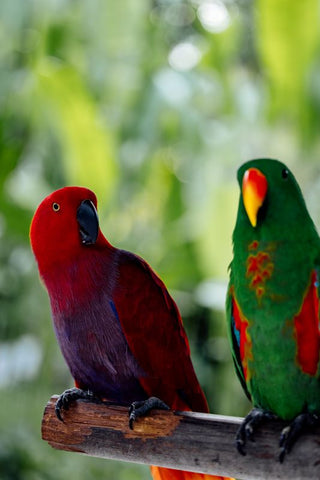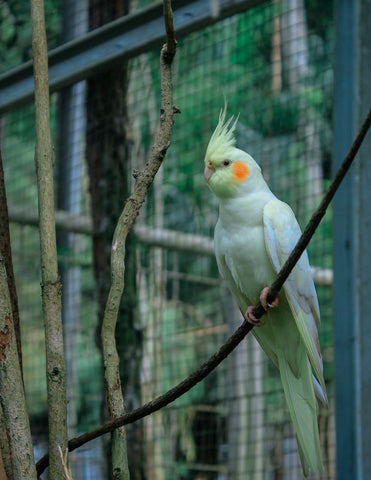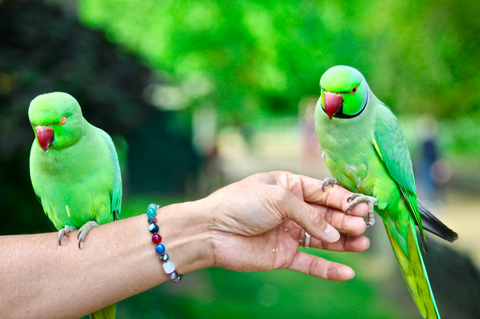Pet Birds 101: 7 Basic Requirements for owning a bird
Introduction
When considering the idea of bringing a feathered friend into your home, it's important to understand that owning a pet bird is a unique and rewarding experience. Birds are known for their charming personalities, striking plumage, and delightful songs. However, they also have specific needs that require careful attention and care to ensure they thrive in a domestic setting.
In this comprehensive guide, we will explore the basic requirements for owning a pet bird. Whether you're new to avian companionship or looking for a refresher, this article will provide you with the essential information to make your bird ownership journey a success.
Table of Contents
- Selecting the Right Bird Species
- Housing and Cage Requirements
- Proper Nutrition
- Social Interaction and Enrichment
- Grooming and Health Care
- Creating a Safe Environment
- A Helpful Tool for Bird Owners
1. Selecting the Right Bird Species

The journey to pet bird ownership begins with selecting the right bird species for your lifestyle and preferences. Different bird species have different care requirements and temperaments. Consider factors like size, personality, and noise levels when making your choice. Some popular pet bird species include:
- Budgerigars (Budgies): Small, social, and fun.
- Cockatiels: Known for their charming crests and gentle nature.
- Lovebirds: Social and affectionate birds that form strong bonds with their owners and each other.
- Conures: vibrant and energetic, known for their striking colors, and playful personalities.
- African Greys: renowned for their exceptional intelligence and impressive vocabulary. They are one of the best talkers among parrot species.
- Macaws: known for their vibrant plumage and outgoing personalities. They are the largest parrots and require a significant amount of space.
2. Housing and Cage Requirements

One of the most crucial aspects of bird ownership is providing your feathered friend with a suitable living space. Here are some key points to consider when it comes to housing and cage requirements:
- Size Matters: Choose a cage that allows your bird to stretch its wings and move freely. Larger cages are generally better.
- Bar Spacing: Ensure the bar spacing is appropriate for your bird's size to prevent escapes or injuries.
- Location: Place the cage in a well-lit, draft-free area away from direct sunlight and household hazards.
- Furnishings: Include perches, toys, and feeding dishes to keep your bird engaged.
3. Proper Nutrition

A well-balanced diet is essential for the health and happiness of your pet bird. Different bird species have varying dietary needs, but a typical diet should include:
- High-quality bird pellets: These provide essential nutrients.
- Fresh fruits and vegetables: Offer a variety to ensure a diverse diet.
- Nuts: Parrots love nuts. Large birds especially like large shelled nuts.
- Seeds: Limit seed as they do not offer much in terms of nutrition.
- Freshwater: Ensure that clean water is always available.
4. Social Interaction and Enrichment

Pet birds are highly social animals and thrive on interaction with their human companions. Consider the following:
- Daily Interaction: Spend time with your bird every day, talking to them, playing, and offering attention.
- Toys and Enrichment: Provide a variety of toys and activities to keep your bird mentally stimulated.
- Out-of-Cage Time: Allow your bird to explore outside the cage in a safe and supervised environment.
5. Grooming and Health Care
Just like any pet, birds need regular grooming and health care. Some aspects to keep in mind include:
- Nail and Beak Trimming: Depending on the species, your bird may require nail and beak maintenance.
- Feather Care: Regularly check your bird's feathers for signs of damage or abnormal molting.
- Avian Veterinarian Visits: Schedule regular check-ups with an avian veterinarian to monitor your bird's health.
6. Creating a Safe Environment

Bird-proofing your home is essential to ensure your pet's safety. Take the following precautions:
- Avoid Toxic Substances: Keep harmful chemicals, plants, and items out of your bird's reach.
- Supervision: When your bird is out of its cage, supervise their interactions with other pets and household objects.
- Temperature Control: Ensure your bird is safe from extreme temperature changes and drafts.
7. A Tool to Help Bird Owners
As a devoted pet owner, it's essential to go the extra mile in providing your feathered friend with the best possible care and entertainment. This is where a subscription box like Squawk Box can truly enhance your pet bird's life. Squawk Box is a subscription service tailored specifically for pet birds, offering a variety of toys and treats that can benefit both you and your avian companion.

What is Squawk Box?
Squawk Box is a monthly subscription service designed to keep your bird mentally stimulated, physically active, and delighted. This service curates a selection of toys and treats and delivers them right to your doorstep. Here's how Squawk Box can help when owning a pet bird:
1. Mental Stimulation
Birds are highly intelligent creatures, and they require mental stimulation to prevent boredom and encourage mental agility. Squawk Box provides a rotating selection of toys that challenge your bird's problem-solving abilities and keep their minds engaged. From puzzles to foraging toys, these items can offer hours of entertainment for your feathered friend.
2. Variety in Diet
A healthy diet is a crucial component of your pet bird's well-being. Squawk Box includes a variety of nutritious treats in each subscription. These treats can supplement your bird's diet and provide essential vitamins and minerals. Offering different flavors and textures can also make mealtime more exciting for your pet.
3. Convenience
Squawk Box makes pet bird ownership more convenient. You don't have to worry about constantly searching for new toys and treats for your feathered friend. The subscription service ensures a regular supply of fresh and exciting items, saving you time and effort.
4. Quality Assurance
The team behind Squawk Box is committed to your pet's well-being. They carefully select and test each item to ensure it meets high-quality standards. You can trust that the toys and treats your bird receives are safe and suitable for their enjoyment.
5. Bonding Opportunity
Sharing the joy of discovering new toys and treats with your pet bird can be a bonding experience. As you introduce each new item, you have the chance to interact with your bird and witness their excitement. It's a wonderful way to strengthen your relationship.
Conclusion
Bringing a pet bird into your home is a rewarding experience, but it comes with responsibilities. By selecting the right bird species, providing a suitable cage, offering a balanced diet, ensuring social interaction and enrichment, practicing grooming and health care, and creating a safe environment, you can provide a loving and thriving home for your avian companion.
Remember, each bird has its unique requirements, so consult with experts and do your research to provide the best care for your feathered friend. With dedication and attention, you can build a strong and lasting bond with your pet bird.

